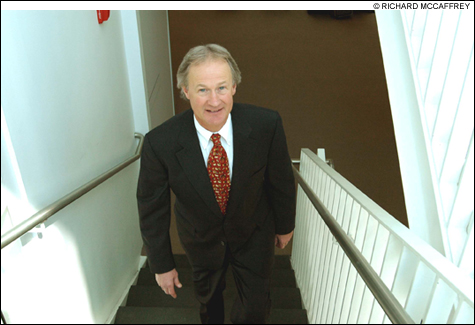
WELL-LIKED: Chafee, shown near his office at Brown, remains a very popular figure in Rhode Island. |
For now, Lincoln Chafee has the luxury of discussing his political future as a riddle wrapped up in an enigma.
While he says he loves teaching at Brown University’s Watson Institute — where he took up a post after losing his US Senate seat in 2006 — Chafee says the job is on a semester-by-semester basis, and he adds, “My own feeling is that my value here is what I bring from the outside, and that the longer I stay, the less value that I have.”
So, does that mean that the well-liked and quirky Republican-turned-independent, who has previously floated the possibility of running for governor, general treasurer, or mayor of Providence in 2010, is planning his return to politics? Is an ongoing burst of public appearances due just to the April 1 release of his new book, Againstthe Tide: How a Compliant Congress Empowered a Reckless President (St. Martin’s Books), or is it a taste of things to come?
Offering what has become something of a pro forma response, Chafee, 55, demurs when asked about his future, talking about how good it has been “to have a normal life again,” and how he’s at “a point in my life to make some good decisions.”
“I will say that I enjoy the challenges that elective office brings, and I am starting to think about it, and it is starting to loom on the horizon now,” Chafee adds during a recent interview, offering more of a nod to the real world of politics than when he called 2010 “a long way away” during an appearance on WJAR-TV’s 10 News Conference a few weeks ago. After doing whatever he can to help Barack Obama’s presidential campaign, the former senator says, he hopes to make some decisions at the end of this year.
Coming from most politicians, such hedging would seem suspect. Yet there’s little question that Chafee — to the delight of his admirers, and to the chagrin of his critics — marches to the beat of a different drummer. For a guy who spent years shoeing horses in Montana and Canada after his graduation from Brown in 1975, it wouldn’t be completely out of the question for him to take a walk.
Yet for connoisseurs of Rhode Island politics, the most tantalizing possibility would be an unprecedented three-way gubernatorial battle royal featuring a Democrat to be named later; Republican Stephen P. Laffey, Chafee’s hard-charging GOP primary opponent from 2006; and the independent Chafee, who embodies an appealing Ocean State tradition that blends liberalism, moderation, and fiscal conservatism.
With the state facing crushing budget deficits and continued partisan warfare between Republican Governor Donald L. Carcieri and the Democrat-controlled General Assembly, the grim fiscal outlook can be expected to persist through the next statewide election.
Considering this, the three-way gubernatorial scenario would offer a provocative choice to voters.
Laffey, who isn’t shy in describing his skill set as the answer for Rhode Island’s woes, would wield a sharply confrontational approach against legislative Democrats. A yet-to-be-determined number of Democratic candidates will tout an ability to get more done than the departing Carcieri. And Chafee — with a golden name and a credential as the only Senate Republican to vote against the war in Iraq — could offer both a collaborative approach and a demonstrated ability to go against the political grain.
Looking to 2010
Chafee’s participation in the 2010 gubernatorial election would pose the central question of who’s better equipped to save Rhode Island from its ongoing budgetary nightmare:
• A Democrat. Democrats haven’t held the governor’s office since Bruce Sundlun yielded power in the mid-’90s, and though Carcieri hasn’t much delivered on his initial promise — as reflected by his sinking approval ratings — Rhode Islanders have a record of favoring divided government.
• A (Republican) man on a mission like Laffey. Although he disputes his suitability for the conservative label, the former Cranston mayor favors school vouchers, privatizing public services, making permanent the Bush tax cuts, and other emblems of the contemporary conservative movement.